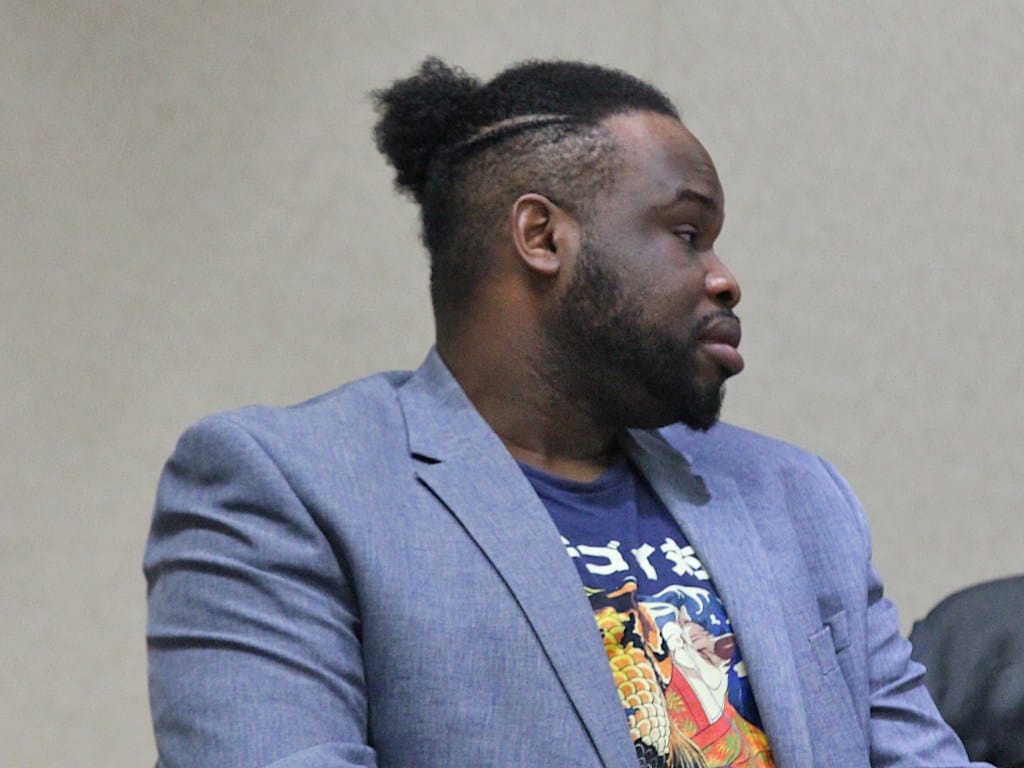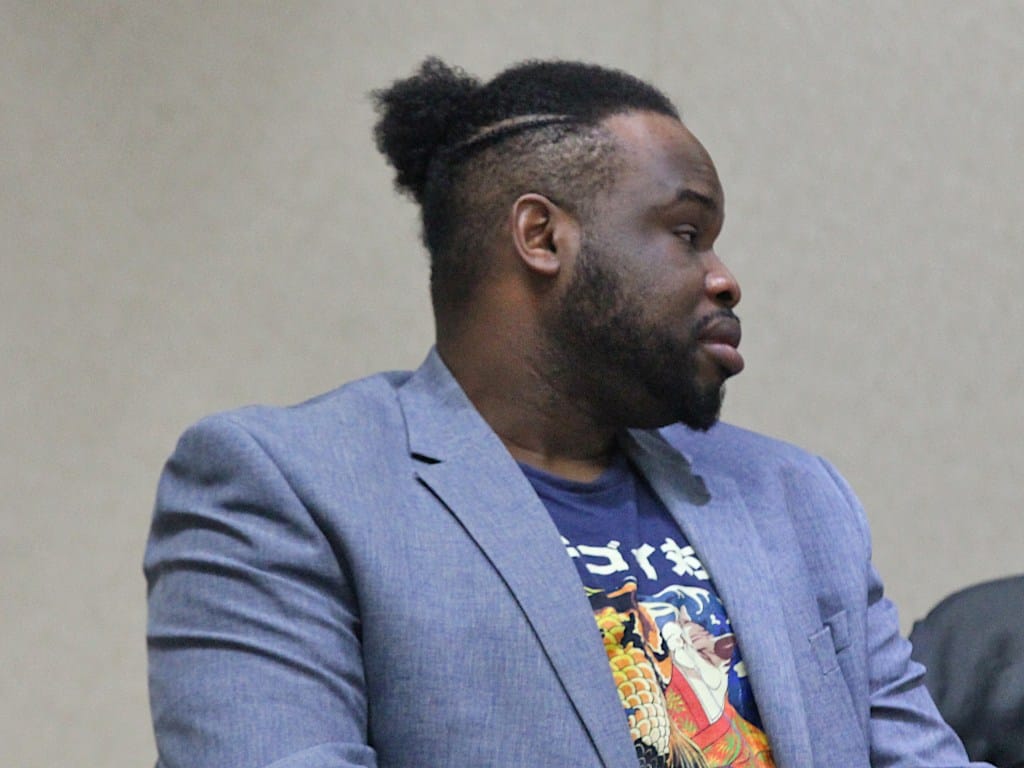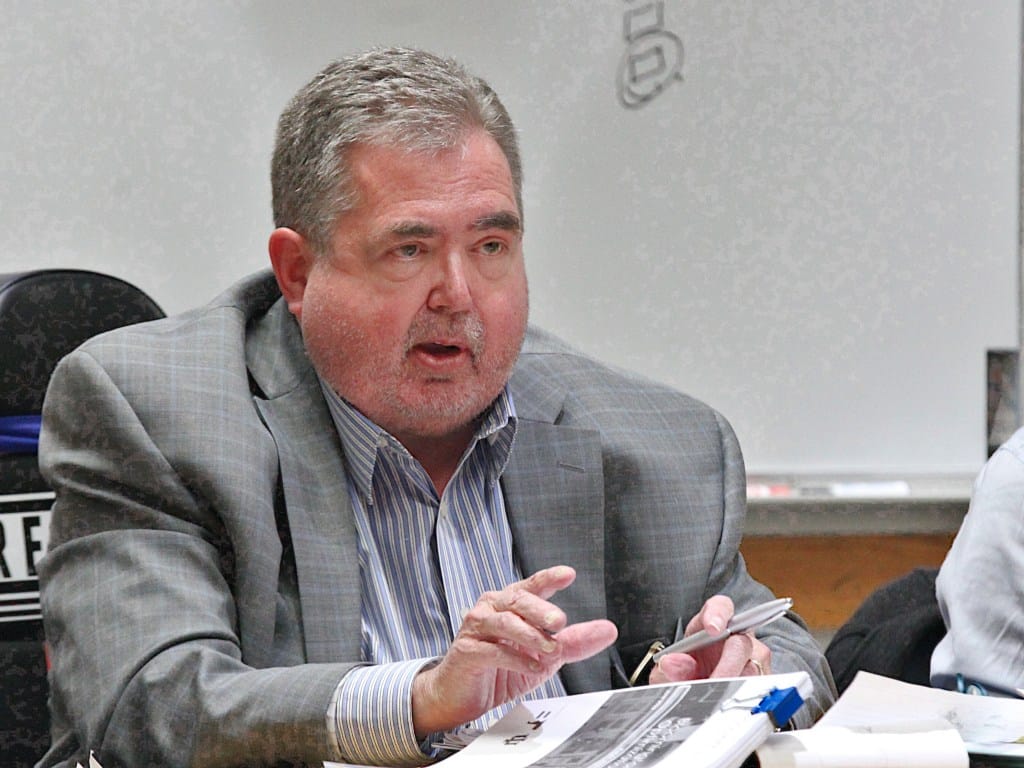Monroe County Green Party leaders: “We’re not asking you to join the party, we’re asking you to help organize it.”



On Wednesday night at the Monroe County Public Library (MCPL), around a dozen and a half people attended the first public meeting of the county’s local Green Party caucus.
Among the reasons that organizer Randy Paul and others gave for wanting to establish the Green Party in Bloomington and the rest of Monroe County is a desire to provide some competition to the Democratic Party. Democrats hold all 11 city offices in Bloomington.
In two weeks, municipal elections will be held for just two of those 11 seats—the rest are uncontested, so the Democratic Party nominee will be declared winner by default. Even if Green Party candidates don’t win right out of the gate, they’ll force Democrats to take a harder look their positions on environmental and social justice issues, said Randy Paul, who’s leading the nascent local organization of the Greens.
The word “caucus” in the description of local Greens is not accidental. Application has been made to Indiana’s Green Party, which now considers the local operation to be a “caucus,” according to Paul, who convened the event on Wednesday.
For the caucus to achieve formal recognition as a local party organization, the group now has a year to complete some basic tasks, Paul said. Those tasks include setting up a bank account, electing party officers, and adopting bylaws. The next meeting of the local Green Party caucus—when bylaws will be reviewed, debated, and possibly adopted—is scheduled for Nov. 19. It will be held at the same location as the first one, at the MCPL.
Floated by Paul as a possible idea for the bylaws was the designation of a party officer position for a student. Another idea floated by Paul: Instead of monetary dues, membership could be earned with service activity.
Local Green Party officers could be elected in December, if the bylaws, which will lay out what officers the party has, are adopted by then. On Wednesday forms for recruiting prospective party officers were handed out.
The approach that Paul and a handful of other organizers are taking is to involve people in the early stages: “We’re not asking you to join the party, we’re asking you to help organize it,” Paul said.
The question of who is helping to organize the local Greens led to some animated back-and-forth on Wednesday between Paul and Vauhxx Booker. In May, Booker was a candidate for the Democratic Party’s nomination for an at-large seat on the city council. That back-and-forth went on long enough to lead to the early departure of one of the meeting’s attendees.
Who are these people?
When Paul said there were three people helping to work on a draft of the bylaws, Booker asked who they were. Paul declined to name them, describing them as “people who are within the Democratic Party and are office holders.”
Paul mentioned the efforts of the three on the bylaws in the context of the positive response he’d received from the community, in last eight weeks. That’s the time since he resigned from the Democratic Party and started working on organizing the local Greens.
Paul said, “Some of the response that has been the most positive has been from people who say, ‘I can’t leave the [Democratic] Party, I won’t leave the party, but I will support you, but you cannot give my name out publicly.'”
Booker countered by saying, “Transparency is the hallmark of public process.” Booker said he thought it would be a simple question: Who’s working on the bylaws?
Amanda Sheridan, who’s staffed the Green Party table at Bloomington’s farmers market for a couple of recent Saturdays, weighed in by saying: If you ask someone for advice, and they give it to you in confidence, there’s no reason to break that confidence.
Alex Tanford, who’s worked with Paul on issues over several years, said he agreed with Paul’s strategy of not making enemies. If someone says they’d like to help, but can’t do it publicly, you want to keep them involved, not turn them away, Tanford said.
In declining to name names, Paul said he did not want to put a “party label” on an idea. Booker responded by saying party labels are “not my thing.” Booker said his lack of interest in party labels is clear from the fact that he’d run in a Democratic Primary and is now endorsing an independent and a Republican in the two upcoming council elections.
The exchange between Paul and Booker reached a point that prompted Tanford to say: “This argument is going nowhere. You both are just repeating the same position over and over again. If that’s what this party is going to end up with, I’m outta here, I’ve got better things to do.”
Booker responded: “Don’t shut me down.” At that, Tanford left, saying, “I’ve got better things to do than sit here and listen to this, it is a waste of time.”
Before heading out the door, Tanford added, “Keep me in touch.”
His early departure from the meeting didn’t signal a lack of continued interest in the organizational effort of the Green Party.
Tanford told The Beacon on Friday that the next meeting, which is scheduled for Nov. 19, is on his calendar. Time allowing, he’ll attend, Tanford said.
Tanford reiterated a point to The Beacon that he made at Wednesday’s meeting: Having a clear organizational structure in place, expressed in some bylaws, is crucial if the Green Party is to have a lasting impact on Bloomington’s local political life. Tanford said one of the challenges that progressive-minded people face when they try to come together to work on issues is they often don’t like organizational structure—they perceive it as too rigid.
Tanford suggested that structuring meetings to include a time explicitly dedicated to free discussion could help mitigate the rigid character of the “old business” and “new business” that’s typical for meeting agendas.
Tanford is professor emeritus of law at Indiana University Maurer School of Law.
Platform: “We don’t want to clone the Democratic Party.”
After Tanford left, Paul and Booker continued for a bit longer on the topic of who’s-who.
Booker said his question about the identity of those who were helping with the bylaws was, he thought, a simple question. It was just meant to “check on who’s working on the process,” in the same way that Paul had described how it’s important to check on the county auditor, even if the auditor is your friend.
Paul had earlier described an episode involving elected Democrat Amy Gerstman, which the Herald-Times, in 2017, summarized this way:
Amy Gerstman, who was Monroe County’s auditor before Saulter, was charged in 2013 with six counts of theft and one count of official misconduct. Police accused her of using her county-issued credit card for more than $11,000 in personal purchases. She paid most of it back, pleaded guilty to official misconduct as a felony and was put on house arrest for three months.
The charges against Gerstman were one of eight different scandals listed out in Paul’s letter resigning from the Monroe County Democratic Party. The list included the resignation of Amanda Barge from the county board of commissioners and the suspension of her mayoral campaign, earlier this year, amid allegations of sexual harassment.
Paul talked about the need to recruit and vet candidates, not simply to “slap a party label on them” and send them out to campaign.
The who’s-who question arose again, this time about candidates. Booker wanted to know who the three candidates are, who Paul said had agreed to run for office next year in Monroe County as Green Party candidates. Positions to be elected in 2020 include at-large county councilors, two county commissioners, as well as auditor, treasurer, coroner and surveyor.
Paul responded by saying, “C’mon guys, there’s some politics here!” It would not make sense to “shoot off your guns” now, in October, when no one is paying attention. “We’re holding back back until January,” Paul said.
After the meeting, Paul told The Beacon that those who have said they will run for office as Greens will still need to be vetted by the party—through a process to be laid out in the bylaws.
Booker questioned how candidates could already have been chosen, if a platform was not in place. When he looked at the Green Party’s national platform, he felt like every local Democratic Party candidate would agree with all of it, Booker said.
Part of the answer to the platform question was left to the eventual establishment of a platform committee—after the bylaws are adopted.
At Wednesday’s meeting, Tanford described two basic approaches for identifying local Bloomington and Monroe County issues for the Green Party to work on. One approach, Tanford said, is “Whatever we decide to do depends on an individual taking responsibility for something that bugs them.” The other way is to “try to be more collective and think more strategically,” Tanford said. The second approach would require identifying a couple of key issues around which some momentum could be developed, Tanford said.
One issue that seemed at the meeting like it might have some traction as a local Green Party issue is public transportation.
On Oct. 29, Bloomington Transit (BT) is kicking off a round of public input sessions on a proposed new route configuration. Six of the 12 new routes include reductions in evening service, when compared to their current geographic equivalents. According to Bloomington Transit, the total number of annual service hours will be roughly the same—94,593 now, compared to 94,836 for the proposed new routes.
BT special projects manager Zac Huneck told The Beacon, “[T]hese are study recommendations, which lean toward increasing ridership. As a public transit agency, increasing ridership is not our only goal, and we must also consider those dependent on late evening service, among others who may be impacted. Finding the right balance is our goal through the public engagement process.”
At Wednesday’s meeting, Paul said the reduction in evening service in the proposal was not consistent with the community’s stated goals on reducing greenhouse gas emissions to mitigate climate change: “We’re not enhancing mass transit—which is what we’re supposed to be doing—we’re losing mass transit.”
The idea of Monroe County’s Green Party eventually endorsing candidates from other parties was floated, when Daniel Olsson dropped in on Wednesday’s meeting.
Olsson told the group he is a Democrat who would be seeking nomination for the Indiana House District 61 seat, which is currently held by Matt Pierce. He said he did not think the local Green Party would endorse him as a candidate, but wondered if it might endorse his ideas—say, if he put together an “Indiana Green New Deal.”
Paul did not rule out the possibility that the local Green Party would endorse a candidate from another party, as long as the Green Party did not have a candidate in the race.
After the meeting on Wednesday, Olsson, a recent Indiana University graduate, told The Beacon he wants to build grassroots support for bold, progressive ideas.
Statewide Greens
Monroe County’s local Green Party organizing effort adds to those in six other Indiana counties, that are a bit further along. Candidates for city council are running this fall under the Green Party’s banner in Terre Haute, Portage, Valparaiso, Hobart, Muncie, and Indianapolis.
Two state-level Green Party officials were on hand Wednesday night: Michael Richardson, volunteer coordinator; and George Wolfe who’s vice chair. Wolfe was the Green Party candidate for Indiana Secretary of State in 2018.






Comments ()